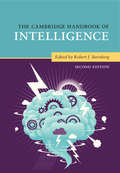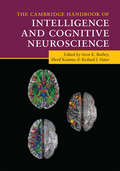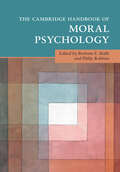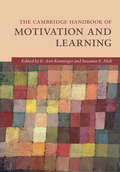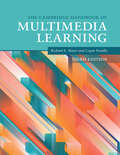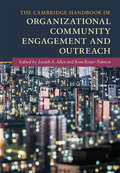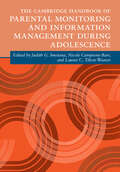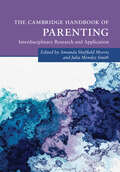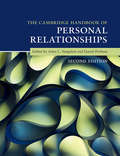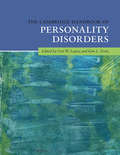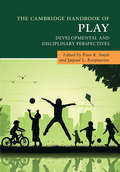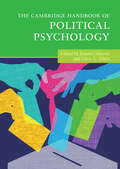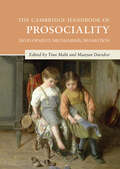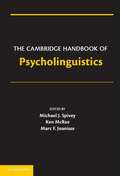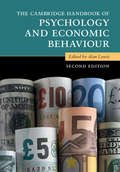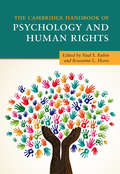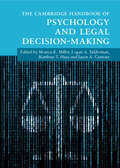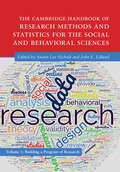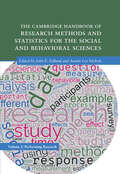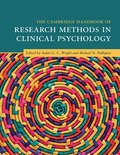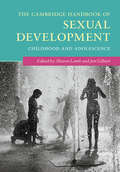- Table View
- List View
The Cambridge Handbook of Intelligence (Cambridge Handbooks in Psychology)
by Robert J. SternbergWritten by the foremost experts in human intelligence. It not only includes traditional topics, such as the nature, measurement, and development of intelligence, but also contemporary research into intelligence and video games, collective intelligence, emotional intelligence, and leadership intelligence. In an area of study that has been fraught with ideological differences, this Handbook provides scientifically balanced and objective chapters covering a wide range of topics. It does not shy away from material that historically has been emotionally charged and sometimes covered in biased ways, such as intellectual disability, race and intelligence, culture and intelligence, and intelligence testing. The overview provided by this two-volume set leaves virtually no area of intelligence research uncovered, making it an ideal resource for undergraduates, graduate students, and professionals looking for a refresher or a summary of the new developments.
The Cambridge Handbook of Intelligence and Cognitive Neuroscience
by Aron K. Barbey Sherif Karama Richard J. HaierThis handbook introduces the reader to the thought-provoking research on the neural foundations of human intelligence. Written for undergraduate or graduate students, practitioners, and researchers in psychology, cognitive neuroscience, and related fields, the chapters summarize research emerging from the rapidly developing neuroscience literature on human intelligence. The volume focusses on theoretical innovation and recent advances in the measurement, modelling, and characterization of the neurobiology of intelligence differences, especially from brain imaging studies. It summarizes fundamental issues in the characterization and measurement of general intelligence, and surveys multidisciplinary research consortia and large-scale data repositories for the study of general intelligence. A systematic review of neuroimaging methods for studying intelligence is provided, including structural and diffusion-weighted MRI techniques, functional MRI methods, and spectroscopic imaging of metabolic markers of intelligence.
The Cambridge Handbook of International Prevention Science
by John L. Moshe Israelashvili Romano"The Cambridge Handbook of International Prevention Science offers a comprehensive global overview on prevention science with the most up-to-date research from around the world. Over 100 scholars from 27 different countries (including Australia, Bhutan, Botswana, India, Israel, Mexico, Singapore, South Korea, Spain and Thailand) contributed to this volume, which covers a wide range of topics important to prevention science. It includes major sections on the foundations of prevention as well as examples of new initiatives in the field, detailing current prevention efforts across the five continents. A unique and innovative volume, The Cambridge Handbook of International Prevention Science is a valuable resource for established scholars, early professionals, students, practitioners and policy-makers"--
The Cambridge Handbook of Metaphor and Thought
by Raymond W. Gibbs Jr.The Cambridge Handbook of Metaphor and Thought offers the most comprehensive collection of essays in multidisciplinary metaphor scholarship that has ever been published. These essays explore the significance of metaphor in language, thought, culture, and artistic expression. There are five main themes of the book: the roots of metaphor, metaphor understanding, metaphor in language and culture, metaphor in reasoning and feeling, and metaphor in nonverbal expression. Contributors come from a variety of academic disciplines, including psychology, linguistics, philosophy, cognitive science, literature, education, music, and law.
The Cambridge Handbook of Moral Psychology (Cambridge Handbooks in Psychology)
by Bertram F. Malle Philip RobbinsThe Cambridge Handbook of Moral Psychology is an essential guide to the study of moral cognition and behavior. Originating as a philosophical exploration of values and virtues, moral psychology has evolved into a robust empirical science intersecting psychology, philosophy, anthropology, sociology, and neuroscience. Contributors to this interdisciplinary handbook explore a diverse set of topics, including moral judgment and decision making, altruism and empathy, and blame and punishment. Tailored for graduate students and researchers across psychology, philosophy, anthropology, neuroscience, political science, and economics, it offers a comprehensive survey of the latest research in moral psychology, illuminating both foundational concepts and cutting-edge developments.
The Cambridge Handbook of Motivation and Learning (Cambridge Handbooks in Psychology)
by K. Ann Renninger Suzanne E. HidiWritten by leading researchers in educational and social psychology, learning science, and neuroscience, this edited volume is suitable for a wide-academic readership. It gives definitions of key terms related to motivation and learning alongside developed explanations of significant findings in the field. It also presents cohesive descriptions concerning how motivation relates to learning, and produces a novel and insightful combination of issues and findings from studies of motivation and/or learning across the authors' collective range of scientific fields. The authors provide a variety of perspectives on motivational constructs and their measurement, which can be used by multiple and distinct scientific communities, both basic and applied.
The Cambridge Handbook of Multimedia Learning (Cambridge Handbooks in Psychology)
by Richard E. Mayer Logan FiorellaDigital and online learning is more prevalent than ever, making multimedia learning a primary objective for many instructors. The Cambridge Handbook of Multimedia Learning examines cutting-edge research to guide creative teaching methods in online classrooms and training. Recognized as the field's major reference work, this research-based handbook helps define and shape this area of study. This third edition provides the latest progress report from the world's leading multimedia researchers, with forty-six chapters on how to help people learn from words and pictures, particularly in computer-based environments. The chapters demonstrate what works best and establishes optimized practices. It systematically examines well-researched principles of effective multimedia instruction and pinpoints exactly why certain practices succeed by isolating the boundary conditions. The volume is founded upon research findings in learning theory, giving it an informed perspective in explaining precisely how effective teaching practices achieve their goals or fail to engage.
The Cambridge Handbook of Organizational Community Engagement and Outreach (Cambridge Handbooks in Psychology)
by Joseph A. Allen Roni Reiter-PalmonThis is an ideal reference for those looking to understand, study, and practice community engagement and outreach. It discusses the different ways individuals - including faculty, administrators, and management in organizations - engage in their communities. It supplies case studies, best practices, and theoretical approaches to the study of community engagement. Scholars active in this field can use this book as an integration of the current knowledge concerning community engagement and as an inspiration for future research agendas. Whilst directing how to implement effective community engagement practices, the book also facilitates the application of organizational theory to community engagement. It will appeal to academics who are interested in the theoretical background of community engagement.
The Cambridge Handbook of Parental Monitoring and Information Management during Adolescence (Cambridge Handbooks in Psychology)
by Judith G. Smetana Nicole Campione-Barr Tilton-Weaver, Lauree C.Delve into the ideal resource for theory and research on parental monitoring and adolescents' disclosure and concealment from parents. This handbook presents ground-breaking research exploring how adolescents respond to parents' attempts to control and manage their activities and feelings. The chapters highlight how adolescents' responses are as important for their mental health and behaviour as parents' attempts to regulate them. Examining responsive, intrusive, and invasive parenting behaviours, the volume addresses modern challenges like monitoring in the digital age and medical decision-making. It covers cutting-edge research on diverse cultures and groups including Latinx, Turkish, Chinese, LGBTQ+, and chronically ill youth. The internationally recognized contributors offer insights from different theoretical perspectives and describe novel methodological approaches, focusing on variations across different developmental stages, contexts, and cultures.
The Cambridge Handbook of Parenting (Cambridge Handbooks in Psychology)
by Amanda Sheffield Morris Julia Mendez SmithParenting is a critical influence on the development of children across the globe. This handbook brings together scholars with expertise on parenting science and interventions for a comprehensive review of current research. It begins with foundational theories and research topics, followed by sections on parenting children at different ages, factors that affect parenting such as parental mental health or socioeconomic status, and parenting children with different characteristics such as depressed and anxious children or youth who identify as LGBTQ. It concludes with a section on policy implications, as well as prevention and intervention programs that target parenting as a mechanism of change. Global perspectives and the cultural diversity of families are highlighted throughout. Offering in-depth analysis of key topics such as risky adolescent behavior, immigration policy, father engagement, family involvement in education, and balancing childcare and work, this is a vital resource for understanding the most effective policies to support parents in raising healthy children.
The Cambridge Handbook of Personal Relationships
by Anita L. Vangelisti Daniel PerlmanThe Cambridge Handbook of Personal Relationships serves as a benchmark of the current state of scholarship in this dynamic field synthesizing the extant theoretical and empirical literature, tracing its historical roots, and making recommendations for future directions. The volume addresses a broad range of established and emerging topics including: theoretical and methodological issues that influence the study of personal relationships; research and theory on relationship development, the nature and functions of personal relationships across the lifespan; individual differences and their influences on relationships; relationship processes such as cognition, emotion, and communication; relational qualities such as satisfaction and commitment; environmental influences on personal relationships; and maintenance and repair of relationships. The authors are experts from a variety of disciplines including several subfields of psychology, communication, family studies and sociology who have made major contributions to the understanding of relationships.
The Cambridge Handbook of Personal Relationships
by Anita L. Vangelisti Daniel PerlmanWith the field of personal relationships having grown dramatically in the past quarter century, The Cambridge Handbook of Personal Relationships, Second Edition serves as a benchmark of the current state of scholarship, synthesizing the extant theoretical and empirical literature, tracing its historical roots, and making recommendations for future directions. Written by internationally known experts from key disciplines, the Handbook addresses both fundamental questions and cutting-edge concerns. This second edition has been thoroughly updated to reflect recent developments in analytical techniques, shifts in theoretical emphases, and an increased attention to social processes. New chapters include the Neuroscience of Salutary Close Relationships; Self-Disclosure in Relationships; Acceptance, Rejection, and the Quest for Relational Value; Relationships and Physical Health; Personal Relationships and Technology in the Digital Age; and Promoting Healthy Relationships. This compendium of state-of-the-art research and theory on personal relationships will be of great value to researchers, graduate students, and practitioners.
The Cambridge Handbook of Personality Disorders (Cambridge Handbooks in Psychology)
by Kim L. Gratz Carl W. LejuezThis Handbook provides both breadth and depth regarding current approaches to the understanding, assessment, and treatment of personality disorders. The five parts of the book address etiology; models; individual disorders and clusters; assessment; and treatment. A comprehensive picture of personality pathology is supplied that acknowledges the contributions and missteps of the past, identifies the crucial questions of the present, and sets a course for the future. It also follows the changes the Diagnostic and Statistical Manual of Mental Disorders (DSM–5) has triggered in the field of personality disorders. The editors take a unique approach where all chapters include two commentaries by experts in the field, as well as an author rejoinder. This approach engages multiple perspectives and an exchange of ideas. It is the ideal resource for researchers and treatment providers at all career stages.
The Cambridge Handbook of Play: Developmental and Disciplinary Perspectives (Cambridge Handbooks in Psychology)
by Jaipaul L. Roopnarine Peter K. SmithPlay takes up much of the time budget of young children, and many animals, but its importance in development remains contested. This comprehensive collection brings together multidisciplinary and developmental perspectives on the forms and functions of play in animals, children in different societies, and through the lifespan. The Cambridge Handbook of Play covers the evolution of play in animals, especially mammals; the development of play from infancy through childhood and into adulthood; historical and anthropological perspectives on play; theories and methodologies; the role of play in children's learning; play in special groups such as children with impairments, or suffering political violence; and the practical applications of playwork and play therapy. Written by an international team of scholars from diverse disciplines such as psychology, education, neuroscience, sociology, evolutionary biology and anthropology, this essential reference presents the current state of the field in play research.
The Cambridge Handbook of Political Psychology (Cambridge Handbooks in Psychology)
by Chris G. Sibley Danny OsborneThe Cambridge Handbook of Political Psychology provides a comprehensive review of the psychology of political behaviour from an international perspective. Its coverage spans from foundational approaches to political psychology, including the evolutionary, personality and developmental roots of political attitudes, to contemporary challenges to governance, including populism, hate speech, conspiracy beliefs, inequality, climate change and cyberterrorism. Each chapter features cutting-edge research from internationally renowned scholars who offer their unique insights into how people think, feel and act in different political contexts. By taking a distinctively international approach, this handbook highlights the nuances of political behaviour across cultures and geographical regions, as well as the truisms of political psychology that transcend context. Academics, graduate students and practitioners alike, as well as those generally interested in politics and human behaviour, will benefit from this definitive overview of how people shape – and are shaped by – their political environment in a rapidly changing twenty-first century.
The Cambridge Handbook of Prosociality: Development, Mechanisms, Promotion (Cambridge Handbooks in Psychology)
by Tina Malti Maayan DavidovProsociality is a multifaceted concept referring to the many ways in which individuals care about and benefit others. Human prosociality is foundational to social harmony, happiness, and peace; it is therefore essential to understand its underpinnings, development, and cultivation. This handbook provides a state-of-the-art, in-depth account of scientific, theoretical, and practical knowledge regarding prosociality and its development. Its thirty chapters, written by international researchers in the field, elucidate key issues, including: the development of prosociality across infancy, childhood, adolescence, and beyond; the biological, cognitive, emotional, and motivational mechanisms that underlie and influence prosociality; how different socialization agents and social contexts can affect children's prosociality; and intervention approaches aimed at cultivating prosociality in children and adolescents. This knowledge can benefit researchers, students, practitioners, and policy makers seeking to nurture socially responsible, caring youth.
The Cambridge Handbook of Psycholinguistics
by Michael J. Spivey Ken Mcrae Marc F. JoanisseOur ability to speak, write, understand speech, and read is critical to our ability to function in today's society. As such, psycholinguistics, or the study of how humans learn and use language, is a central topic in cognitive science. This comprehensive handbook is a collection of chapters written not by practitioners in the field, who can summarize the work going on around them, but by trailblazers from a wide array of subfields, who have been shaping the field of psycholinguistics over the last decade. Some topics discussed include how children learn language, how average adults understand and produce language, how language is represented in the brain, how brain-damaged individuals perform in terms of their language abilities, and computer-based models of language and meaning. This is required reading for advanced researchers, graduate students, and upper-level undergraduates who are interested in the recent developments and the future of psycholinguistics.
The Cambridge Handbook of Psychology and Economic Behaviour (Cambridge Handbooks in Psychology)
by Alan LewisPsychologists have been observing and interpreting economic behaviour for at least fifty years, and the last decade, in particular, has seen an escalated interest in the interface between psychology and economics. The Cambridge Handbook of Psychology and Economic Behaviour is a valuable reference resource dedicated to improving our understanding of the economic mind and economic behaviour. Employing empirical methods - including laboratory experiments, field experiments, observations, questionnaires and interviews - the Handbook covers aspects of theory and method, financial and consumer behaviour, the environment, and biological perspectives. With contributions from distinguished scholars from a variety of countries and backgrounds, the Handbook is an important step forward in the improvement of communications between the disciplines of psychology and economics. It will appeal to academic researchers and graduates in economic psychology and behavioural economics.
The Cambridge Handbook of Psychology and Human Rights (Cambridge Handbooks in Psychology)
by Neal S. Rubin Roseanne L. FloresWritten by psychologists, historians, and lawyers, this handbook demonstrates the central role psychological science plays in addressing some of the world's most pressing problems. Over 100 experts from around the world work together to supply an integrated history of human rights and psychological science using a rights and strengths-based perspective. It highlights what psychologists have done to promote human rights and what continues to be done at the United Nations. With emerging visions for the future uses of psychological theory, education, evidence-based research, and best practices, the chapters offer advice on how to advance the 2030 Global Agenda on Sustainable Development. Challenging the view that human rights are best understood through a political lens, this scholarly collection of essays shows how psychological science may hold the key to nurturing humanitarian values and respect for human dignity.
The Cambridge Handbook of Psychology and Legal Decision-Making (Cambridge Handbooks in Psychology)
by Monica K. Miller Matthew T. Huss Logan A. Yelderman Jason A. CantonePresenting state-of-the-art research, this Handbook summarises emerging and establishing topics in the area of legal decision-making. Interdisciplinary in its approach, it covers decisions made within the criminal justice system, the trial process, and clinical settings. Chapters, written by accomplished academics and experts in the field, synthesize historical context, identify gaps in existing literature, propose future directions of study, and discuss policy limitations. It also includes 'perspectives from the field' essays written by professionals – a judge, an attorney, a police officer, a trial consultant, and a probation officer – to bridge the gap between academic research and its application to the real world. It is intended as a go-to resource for students and researchers who want to immerse themselves in a body of scientific research to understand its history and shape its future.
The Cambridge Handbook of Research Methods and Statistics for the Social and Behavioral Sciences: Volume 1: Building a Program of Research (Cambridge Handbooks in Psychology)
by John E. Edlund Austin Lee NicholsThe first of three volumes, the five sections of this book cover a variety of issues important in developing, designing, and analyzing data to produce high-quality research efforts and cultivate a productive research career. First, leading scholars from around the world provide a step-by-step guide to doing research in the social and behavioral sciences. After discussing some of the basics, the various authors next focus on the important building blocks of any study. In section three, various types of quantitative and qualitative research designs are discussed, and advice is provided regarding best practices of each. The volume then provides an introduction to a variety of important and cutting-edge statistical analyses. In the last section of the volume, nine chapters provide information related to what it takes to have a long and successful research career. Throughout the book, example and real-world research efforts from dozens of different disciplines are discussed.
The Cambridge Handbook of Research Methods and Statistics for the Social and Behavioral Sciences: Volume 2: Performing Research (Cambridge Handbooks in Psychology)
by John E. Edlund Austin Lee NicholsIn a time where new research methods are constantly being developed and science is evolving, researchers must continually educate themselves on cutting-edge methods and best practices related to their field. The second of three volumes, this Handbook provides comprehensive and up-to-date coverage of a variety of issues important in developing, designing, and collecting data to produce high-quality research efforts. First, leading scholars from around the world provide an in depth explanation of various advanced methodological techniques. In section two, chapters cover general important methodological considerations across all types of data collection. In the third section, the chapters cover self-report and behavioral measures and their considerations for use. In the fourth section, various psychological measures are covered. The final section of the handbook covers issues that directly concern qualitative data collection approaches. Throughout the book, examples and real-world research efforts from dozens of different disciplines are discussed.
The Cambridge Handbook of Research Methods in Clinical Psychology (Cambridge Handbooks in Psychology)
by Wright Aidan G. C. Michael N. HallquistThis book integrates philosophy of science, data acquisition methods, and statistical modeling techniques to present readers with a forward-thinking perspective on clinical science. It reviews modern research practices in clinical psychology that support the goals of psychological science, study designs that promote good research, and quantitative methods that can test specific scientific questions. It covers new themes in research including intensive longitudinal designs, neurobiology, developmental psychopathology, and advanced computational methods such as machine learning. Core chapters examine significant statistical topics, for example missing data, causality, meta-analysis, latent variable analysis, and dyadic data analysis. A balanced overview of observational and experimental designs is also supplied, including preclinical research and intervention science. This is a foundational resource that supports the methodological training of the current and future generations of clinical psychological scientists.
The Cambridge Handbook of Second Language Acquisition
by Julia Herschensohn Martha Young-ScholtenWhat is language and how can we investigate its acquisition by children or adults? What perspectives exist from which to view acquisition? What internal constraints and external factors shape acquisition? What are the properties of interlanguage systems? This comprehensive 31-chapter handbook is an authoritative survey of second language acquisition (SLA). Its multi-perspective synopsis on recent developments in SLA research provides significant contributions by established experts and widely recognized younger talent. It covers cutting edge and emerging areas of enquiry not treated elsewhere in a single handbook, including third language acquisition, electronic communication, incomplete first language acquisition, alphabetic literacy and SLA, affect and the brain, discourse and identity. Written to be accessible to newcomers as well as experienced scholars of SLA, the Handbook is organised into six thematic sections, each with an editor-written introduction.
The Cambridge Handbook of Sexual Development: Childhood and Adolescence (Cambridge Handbooks in Psychology)
by Sharon Lamb Jen GilbertThe Cambridge Handbook of Sexual Development is a carefully curated conversation that brings together the top researchers in child and adolescent sexual development to redefine the issues, conflicts, and debates in the field. The Handbook is organized around three foundational questions: first, what is sexual development? Second, how do we study sexual development? And third, what roles might adults - including the institutions of the media, family, and education - play in the sexual development of children and adolescents? As the first of its kind, this collection integrates work from sociology, psychology, anthropology, history, education, cultural studies, and allied fields. Writing from different disciplinary traditions and about a range of international contexts, the contributors explore the role of sexuality in children's and adolescents' everyday experiences of identity, family, school, neighborhood, religion, and popular media.
